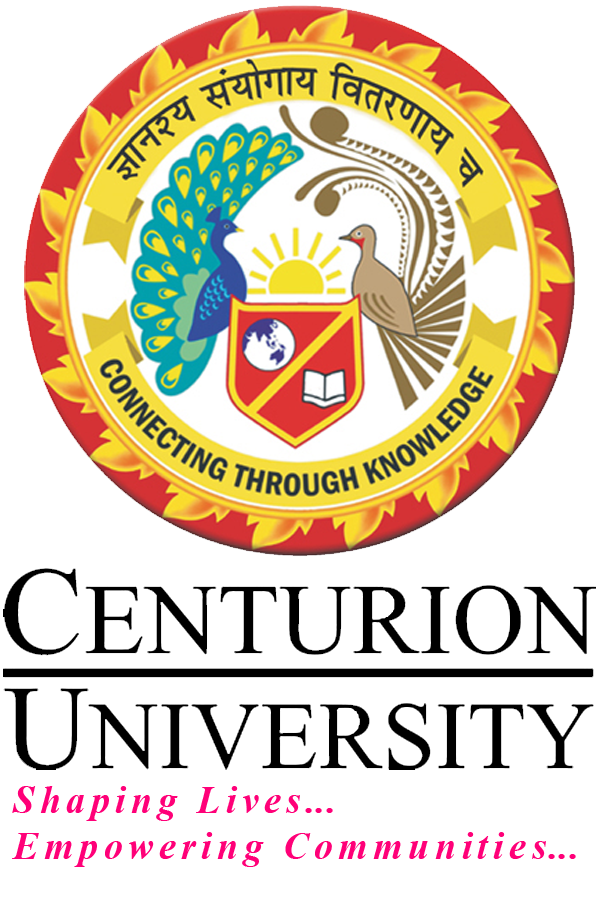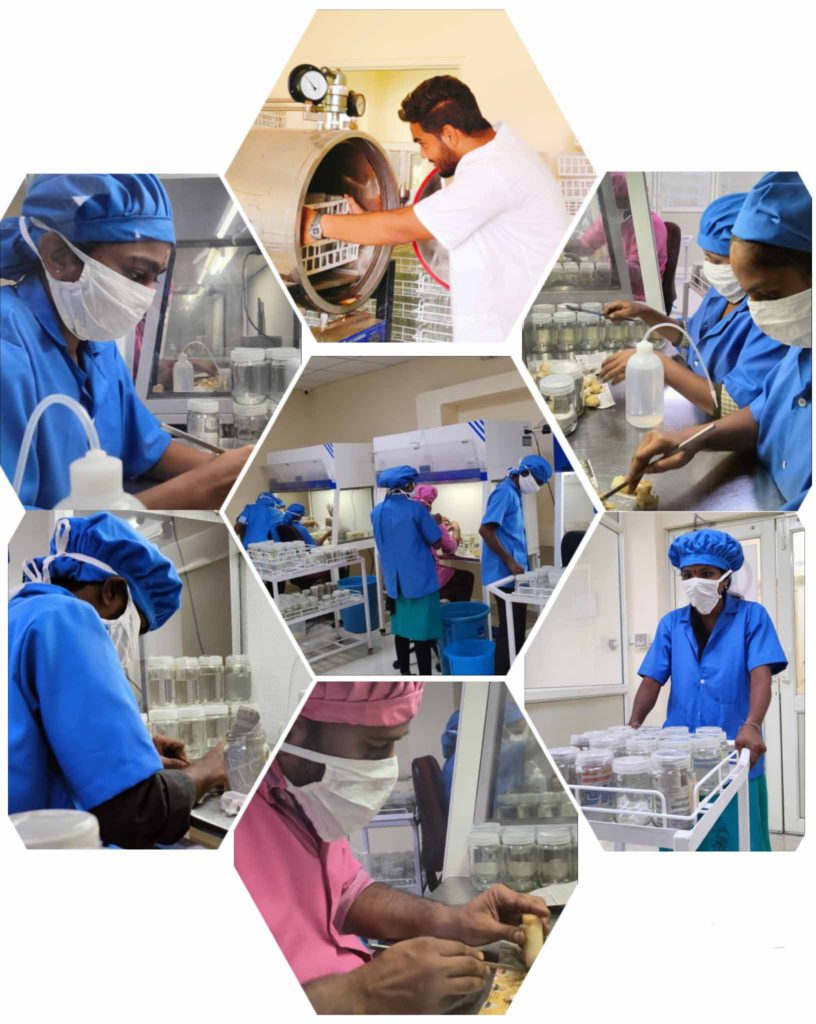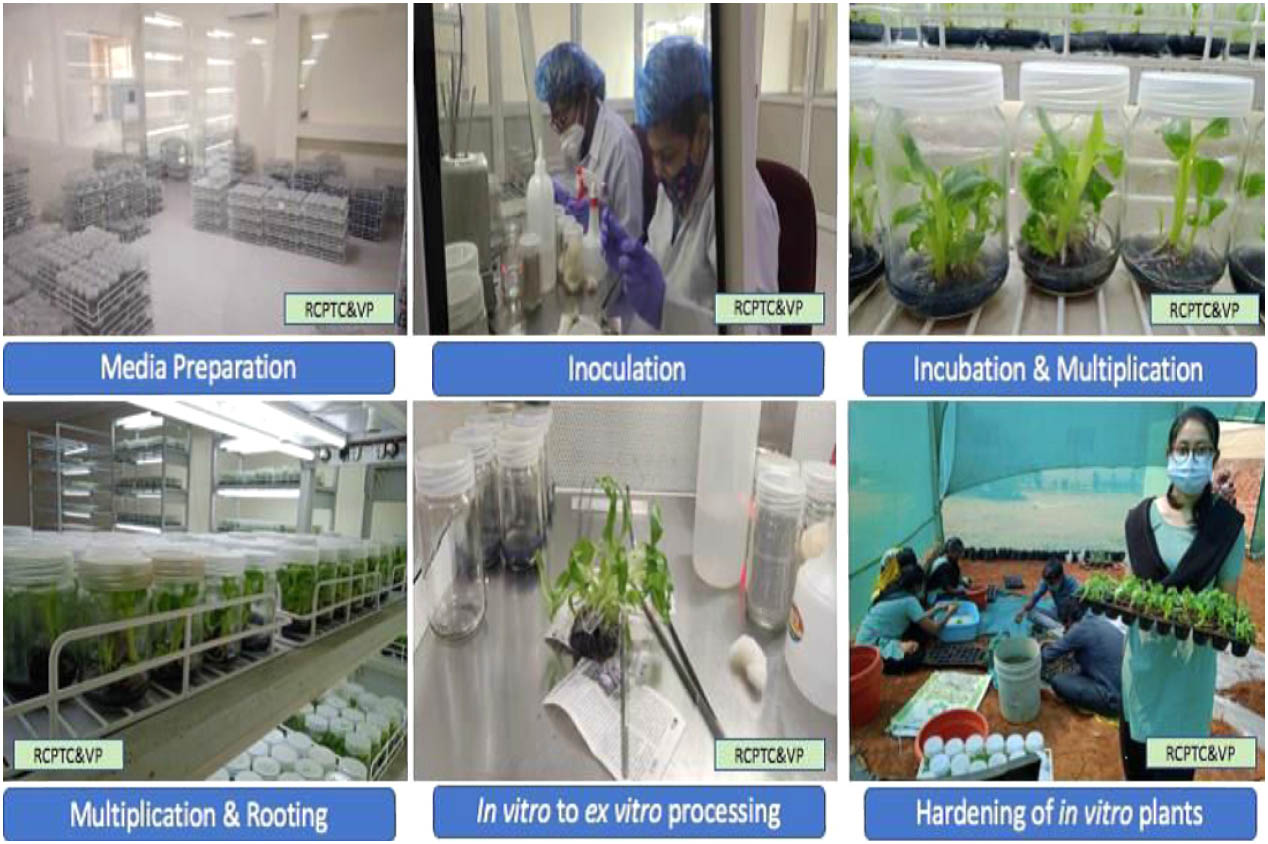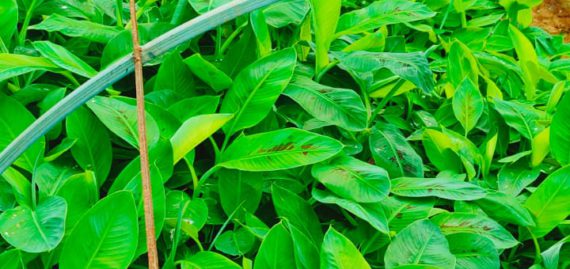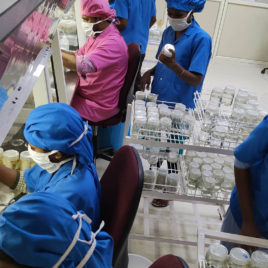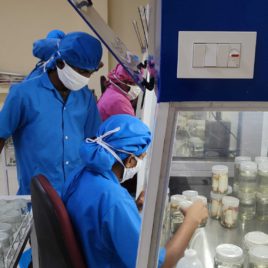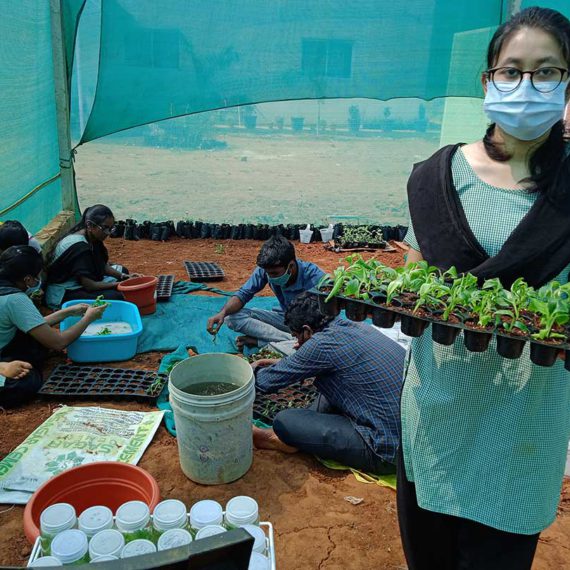The domain plant tissue culture & vegetative propagation impartshands-on experience to the students to work and focus on asexual propagation techniques including micro-propagation (plant tissue culture techniques), vegetative propagation like grafting, cuttings usage, etc. The process of plant production/plant multiplication which can be carried out byusing our own plant material with less investment, through which the students get industry-academia experience. Commercial cultivation of crops mainly aims at genetic fidelity,enhanced productivity, disease-free/resistant plants and plants with desired characteristics.The two major applications of the domain is to conserve the germplasm varieties and maintain genetic fidelity among the plants produced in vitro. Such materials are maintained for their original characteristics can also be explored for research and development as well as breeding programs.
Domain Track : Plant Tissue Culture and Vegetative Propagation
Course Attendees
Still no participant
Course Reviews
Still no reviews
Track Total Credit (T-P-P): 9-9-11
Domain Track Objectives:
To impart and encourage students to get inculcate and accustomed to the industry-academia propagationof horticulture plants at large scale.
Domain Track Learning Outcome:
Hands-on knowledge acquisitionto produce large scale GM-free horticulture plants.
Course Division:
Track Courses (3-6-0)
- Technologies of Plant Tissue Culture(1-2-0)
- Biotransformation using plant cells, organ cultures and enzyme systems (1-2-0)
- Vegetative Propagation – Methods and Techniques(1-2-0)
Practice Courses (0-9-0)
- Commercial Plant Tissue Culture (0-3-0)
- Applied Plant Tissue Culture(0-3-0)
- Techniques for conservation of Plant Genetic Resources (0-3-0)
AELP Project (0-0-11)
- Commercial production of horticultural crops like Banana.
- In vitro micro-propagation of banana and hardening.
- Protocol standardization for in vitro micro-propagation of horticulture crops like Bamboo, Gerbera, Orchids, etc.
- Propagation of ornamental crops through cuttings.
- Propagation of annual flower crops through seeds.
- Propagation of fruit crops through layering.
- Plant genomic DNA isolation, PCR amplification and its assessment.
- Development of Doubled Haploid and F2 generation mapping populations in maize for the identification of QTLs for seed yield components in maize.
Technologies of Plant Tissue Culture (1-2-0)
Introduction to Laboratory organization: Tools and techniques, methods of sterilization. Laboratory contaminants- it’s control and measures.Media and Culture Preparation: Role of Micro and macro nutrients, Vitamins and carbon source in tissue culture, Media preparation- pH, Temperature, Solidifying agents, Slant Preparations etc. Maintenance of cultures, Environmental Conditions, explants characteristics.
Culture techniques: Explants selection, sterilization and inoculation; Various media preparations; MS, B5, SH PC L-2; Callus and cell suspension culture.
Initiation of Cultures: Induction and growth parameters; Culture initiation, Callus culture., Micro-propagation through various explants (Leaf, Stem, Axillary bud, Tuber, Corms and Bulbills).
In-vitro Fertilization: Role of Ovary and ovule in in-vitro Fertilization in production of agricultural and horticultural crops. Techniques and significance of Androgenesis and Gynogenesis (ovary, ovule, egg, synergids culture).
Practice: Tools and techniques, methods of sterilization. Laboratory contaminants, Media preparation- pH, Temperature, Solidifying agents, Slant Preparations, Explants selection, sterilization and inoculation.
2.Biotransformation using plant cells, organ cultures and enzyme systems (1-2-0)
Organ Culture: Anther, Pollen, Embryo and Endosperm culture, Hairy Root Culture and their applications. Organogenesis and Somatic embryogenesis- Techniques and Applications.
Protoplast Culture: Protoplast-Isolation regeneration and Viability test, Somatic hybridization and methods of protoplast fusion- chemical, Viral, electrofussion. Practical application of somatic hybridization and cybridization.
Crop Improvement: Somaclonal variation, its genetic basis and application in crop improvement. Cell/callus line selection for resistance to herbicide, stress and diseases. Role of tissue culture in rapid clonal propagation, production of pathogen - free plants and “synthetic seeds”.
Transgenics:Transgenic plants for crop improvement (dicot and Monocot including Maize, Rice, Wheat, Cotton, Brinjal etc. Resistance to herbicide, insecticide, virus and other diseases, Flavr savr tomato, barnase and barstar, etc). Transgenic plants for molecular farming.
Plant transformation: Methods of gene transfer in plants. Agrobacterium and CaMV mediated gene transfer; direct gene transfer using PEG, micro injection, electroporation, microprojectile (biolistics) method, liposome mediated DNA delivery; Transposons as vectors.
Practice: Anther, Pollen, Embryo and Endosperm culture, Hairy Root Culture and their applications. Organogenesis and Somatic embryogenesis- Techniques, Protoplast-Isolation regeneration and Viability test, methods of protoplast fusion- chemical, Viral, electrofussion. Synthetic seed preparation, callus line propagation and selection for abiotic/biotic stress tolerance, Agrobacterium gene transfer.
-
Vegetative Propagation – Methods and Techniques (1-2-0)
Vegetative Propagation I: Introduction, Reasons to propagate by cuttings, Types -softwood, hardwood, semi hardwood, herbaceous, Stem Cuttings, Tip, heel, nodal, basalLeaf and Leaf-bud cuttings, Cane cuttings, Root Cuttings, Bulb Cuttings, Hormone Treatments for Cutting Propagation, Other Cutting Treatments; basal wounding, anti-transpirants, fungicides, disinfectants, mycorrhiza, etc. Artificial Light for Propagation, Cutting Propagation Efficiency, Rockwool Propagation.
Vegetative Propagation II: Care of stock plants, Layering, Division, Terminology and Managing Watering.
Vegetative Propagation III: Terminology, Budding and grafting, Reasons for Grafting, how a Graft forms, Grafting Techniques; Types of Grafts, What Plant to Graft on WhatGrafting Materials, Root Grafting, Bench Grafting, Soft Tissue Grafting.
Propagation Structures and Materials: Growing in a Greenhouse, Growing Structures: Types of Greenhouses, Cold Frames, Shadehouses, Propagating equipment -Heaters, Bottom Heat, Misting, Light Control, Benches etc., Managing a Greenhouse.
Practice: Preparation of different types of cuttings for ornamental crops and vegetable crops i.e., Croton, Acalypha, Araelia, Diffenbachia, Coleus, Sanseveria, Chrysanthemum, Tuberose Ivy gourd, Pointed gourd, water spinach, Drum stick, Elephant foot yam, Colocasia and curry leaf.
Practice of different types of grafting and budding methods for fruit and ornamental crops i.e., Mango, Rose, Sapota, Citrus Spp. Practice of different types of layering for fruit and ornamental crops i.e., Bougainvilllea, Guava, Litchi, Pomegranate and lime.
Practice Courses
-
Commercial Plant Tissue Culture (0-3-0)
Micropropagation and its Applications; Types, Stages, Establishment of propagated plants, micropropagation for large scale multiplication of crop plants, forest trees, medicinal plants and ornamentals. Germplasm preservation- Definition, Importance and Methods, In-situ and Ex-situ conservation, Centers of germplasm preservation in India. Hardening: Hardening stages, Role of Polyhouse, Net House, Compost, Chemical fertilizer, Cocopit, Soil in hardening. Floriculture – commercial floriculture – Production of cut flowers and home floriculture. Disease and pest control in gardening- Fungicides and pesticides. Plant growing problems and their control, cold house storage. Commercial Horticulture: Propagation of Horticultural crops by tissue culture techniques such as Banana, Sugarcane, Papaya, Mango and some Medicinal and Aromatic plants.
-
Applied Plant Tissue Culture (0-3-0)
Preparation of various Tissue culture media (MS,B5, Gamber’s etc.), Effect of Growth Hormones on organogenesis: a) Shoot differentiation, b) Callus differentiation, Root differentiation. Single cell culture. Shoot tip, auxillary bud, Meristem culture. Propagation of horticultural. Propagation of Medicinal plants. Propagation of Aromatic plants. Hardening methods and their utility. Agrobacterium mediated gene transfer. Protoplast fusion by PEG. Preparation of artificial seeds. Liposome mediated gene transfer. Effect of Auxins and Gibberllins on seed germination. Studies on enzyme amylase. Effect of temperature and alcohol on permeability of cell membrane. Test for starch, Glucose, Tannins and Alkaloids. Isolation of DNA and RNA from Plants. Amplification of plant DNA by using random primer. Determination of specific activity of the enzyme. Separation of DNA by agarose gel electrophoresis.
-
Techniques for conservation of Plant Genetic Resources (0-3-0)
Plant genetic resources- Different kinds of PGR basic, derived and molecular, core collections, principles of germplasm characterization, DNA fingerprinting and plant barcodes, germplasm evaluation, maintenance and regeneration, In-situ and ex-situ methods of conservation, cryopreservation of genetic materials, gene banks and cryobanks.
Job Offers:
- Seed Breeders in Seed Companies (DuPont, NuzeVedu Seeds, Monsanto, Advanta, etc.)
- Horticulturists – Nurseries, NGO’s, Agriculture Set-up, Entrepreneurs, MNC Companies (Indo-Amercian Seeds, Kaveri Seeds, Infosys, Syngenta, Biocon, etc.)
- Scientists (Any research organizations)
- Research Technician (Any research organizations)
- Higher Education (M.Sc.-Horti, Biotech, Plant Molecular Biology, Breeder, etc.)
Media

Our Main Teachers

Dr. Pushpalatha G., Professor, Department of Plant Biotechnology, Centurion University of Technology and Management, Odisha has many accomplishments. As a Principle Investigator (PI), she runs a project entitled ‘Genome-wide haplotype analysis for salt tolerance associated candidate genes in rice’ funded by SERB (TAR/2021/000258 dated 2nd December 2021), Government of India, India. She is also a […]

An Assistant Professor in Department of Horticulture at M.S. Swaminathan School of Agriculture, Centurion University of Technology and Management. She is specialized in floriculture and landscape horticulture. She is a doctorate from University of Horticultral Sciences, Bagalkot and had 4 years of research experience in tissue culture. She contributed to many national and international publications


